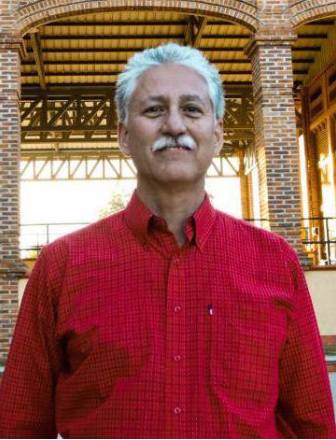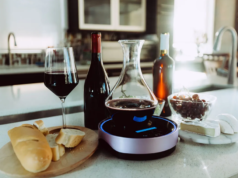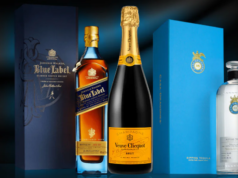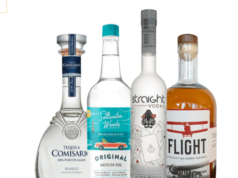Interview With DeLeon Tequila Distiller Miguel Cedeño Cruz (DrinkSpirits).
The response to our DeLeón Tequila review was so great, it lead to this follow-up interview with DeLeón Distiller Miguel Cedeño Cruz, who helps shed some light on the production process for DeLeón.
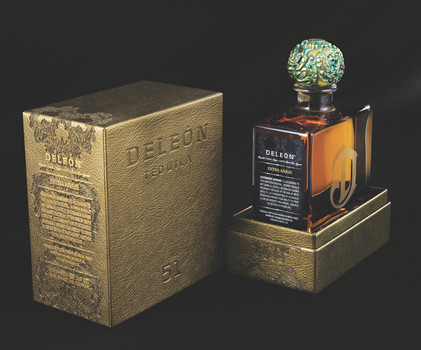
How many times is DeLeón Platinum Distilled?
DeLeón Tequila is produced using Alembic-style pot distillation and is twice distilled, allowing the tequila to retain its richness and nuanced character.
Does DeLeón use a diffuser in the production of its tequila?
No diffusion band extraction is utilized in the process of producing DeLeón Tequila. We employ traditional techniques – it is not a quick process. It takes time to create DeLeón and the process cannot be rushed using diffusion.
In some tequilas, a diffuser is used to extract inulin in raw agave without cooking, followed by acid hydrolysis to release fermentable sugars. Using this method creates a more neutral profile and does not yield the desired baked notes, given there is no cooking of the piñas. Additionally, some distilleries also utilize a column still to achieve a more neutral profile and expedite the production process – DeLeón does not employ either of these methods.
DeLeón employs traditional yet lengthy techniques to fully develop a number of nuances of flavor. Rushing the process by using a diffuser does not yield the desired result. DeLeón’s taste profile is crafted through each and every step of the traditional batch process, which has been perfected over multiple trials and rounds of product testing.
Does DeLeón use a tahona to grind their roasted agave?
We do not use a tahona – the agaves used to produce DeLeón tequila are pressed using traditional mills.
What technique was used to focus the spirit in the flavor direction it is in?
The traditional tequila production methods that we utilize involve a very energy-intensive batch process which takes approximately 3 full weeks from the time of harvest to the point where the liquid is ready to be bottled. There are a number of techniques employed throughout DeLeón’s process that lend themselves to the final flavor profile you taste from the bottle.
One of the things that sets DeLeón Tequila’s flavor apart is use of exceptional ingredients – agaves are hand-selected at harvest for highest quality and peak ripeness so the plants yield the sweetest piñas, giving the tequila its abundant character and balance. DeLeón’s agave grows anywhere from 6-8 years in direct sunlight in the soil. Because conditions are not equal in all fields, the plants mature independently and are harvested individually as they reach prime maturation. Overripe plants begin to decay and develop off-tasting notes.
Because each agave is unique, once they arrive at the distillery they are cut into halves, thirds or quarters dependent on the size of the particular agave. This is to ensure that we will have even baking in the clay ovens. The central part of the plant, known as the Cogollo, is removed as it adds bitterness to the final product. This isn’t a standard industry practice and helps DeLeón become a smoother, sweeter, and less-bitter tequila.
Next, the agave is transferred to the traditional brick and clay ovens where it is slow roasted. During the cooking process, I carefully decide where to cut the bitter syrup in order to remove herbal notes & bitterness. The length of cooking is important as agave needs to be baked for the perfect amount of time in order to ensure the desired delicious caramel flavors, but without any burnt notes.
Following cooking, the baked agave is transferred to the press where a traditional mill extracts most of the sugars present. Steel mills spray curtains of water over the now soft agave while pressing to remove all the juice, in order to extract the sugars.
Next, slow fermentation under my guidance, contributes enriched depth and complexity to the agave’s natural sweetness, creating a remarkably nuanced character. In our process, the temperature is controlled to allow for a long fermentation (6-7 days) which is known to produce less fusel oils and develop more complex flavor compounds.
After the fermentation period, the liquid is transferred batch by batch to be distilled in alembic pot stills. DeLeón Tequila achieves its exceptional smoothness and purity in just two distillations—allowing the tequila to retain its rich character acquired during the fermentation process.
Finally, with relentless attention to detail, I cut the beginning and end of the distillation, allowing only the absolute best portion, or Corazón, to find its way into every bottle, creating a subtle taste profile with exceptional smoothness. For most of the aged expressions, an unconventional process blends the art of tequila with the mastery of French winemaking through a unique combination of bold American Oak and fine French wine casks to impart a distinctive, balanced character.
Is there anything special being done in the filtering process?
DeLeón Tequila employs a slow, chill filtration that removes fatty acids that produce heavy vegetative notes which cover up DeLeón’s defining lighter fruity notes, fresh green agave notes and warm spice notes. The finished tequila is filtered using a proprietary unique chill filtration method, which takes some time to complete.
The Leona comes from “estate casks”, which estate and what makes them special? Why is it $850? Please help my readers understand why a tequila should be priced this high!
Reserve Añejo tequilas are selected from my private reserve and blended to capture the ultimate essence of DeLeón’s tequila making style. This exceptional tequila is aged in robust American Oak, and finally rested for more than a year in the finest French Sauternes casks. The result is a deep amber color with notes of fresh fruit, warm cinnamon and an elegant sweet brown spice finish.
Why is DeLeón Platinum neutral in its core, more akin to a tequila-vodka hybrid?
The vision for DeLeón Platinum was to create a tequila with very complex, rich flavor attributes while maintaining a subdued and smooth finish that tequila aficionados and vodka consumers alike can enjoy.
What is DeLeón’s brand architecture strategy?
In general, as you move up the ultra-premium or luxury portfolios the tequilas increase in complexity and richness of flavor (see below for rationale for each variant). Longer aging normally develops a greater depth of flavor, except for in the case of Leóna (which is an añejo but develops very intense and complex fruit and spice notes from aging for over a year in Sauternes barrels, making the flavor very similar to cognac).

Ultra-Premium Line:
- Platinum: this blanco is the definition of smooth with unrivaled richness and complexity; appeals to discerning tequila drinkers who want the next level in sipping tequila
- Reposado: blends the craft of the French wine master with the art of fine tequila to create a reposado with the incredible richness and complexity imparted by aging in both American and French Oak; appeals to discerning drinkers of fine whisky and cognac
- Añejo: blends the craft of the French wine masters with the art of fine tequila to create an añejo with even more richness and complexity and a bolder expression of the honeyed character and rich fruit imparted by aging in French Oak; appeals to discerning drinkers of fine cognac
Luxury Line:
- Diamante: DeLeón’s signature Blanco is blended with extremely rare Añejo’s (including Leóna) that were aged in both American Oak and find French Sauternes casks, giving this joven tequila a touch of additional richness without masking the fresh and herbaceous agave flavor of the Blanco at its core
- Extra Añejo: aged for three years in bourbon barrels and bottled at cask strength, this extra añejo has a warm toffee, sweet spice and dry oak finish; the ultimate whisky lover’s tequila
- Leóna: aged first in American Oak and then again in fine French Sauternes casks, this Añejo tequila is blended from a very small number of barrels that were selected by the master distiller for their nuanced character and depth of flavor; appeals to drinkers of fine cognacs
You use a variety of cask types for DeLeón, what’s the thinking behind this?
The Diamante Joven does not use bourbon barrels, it uses Añejo aged in French wine barrels. The Extra Añejo uses ex-bourbon barrels & is the only product in the line that does not see French wine barrels during aging.
As for the strategy, the craft of French winemaking ties everything together, excepting Extra Añejo. This liquid formulation for Extra Añejo was “inherited”, and was such a wonderful spirit with a “bourbon” style finish that it was decided to keep the profile the same, building off the original amazing liquid to make a fine cask strength tequila, the first of its kind.
Read our complete DeLeón Tequila Review.


